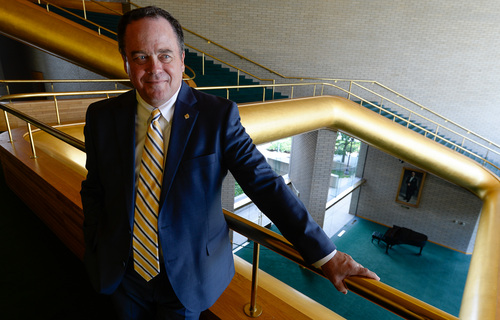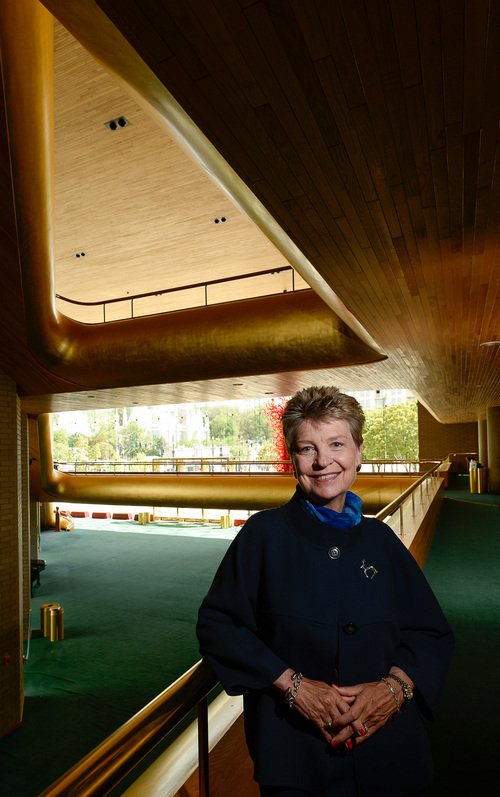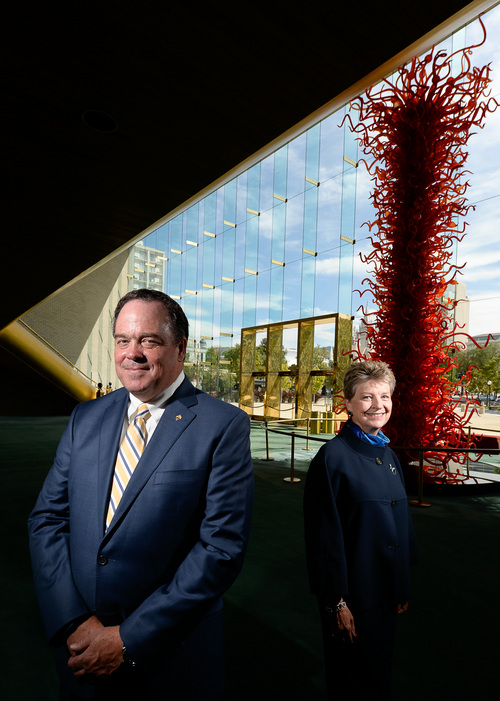This is an archived article that was published on sltrib.com in 2014, and information in the article may be outdated. It is provided only for personal research purposes and may not be reprinted.
Dave Petersen knows he's stepping into big shoes.
"Pat might be the best symphony board chair ever, and not just in Utah," O.C. Tanner CEO Petersen said of retired banker Patricia A. Richards, whom he will succeed as head of the Utah Symphony | Utah Opera board effective Monday.
Richards joined the Utah Opera board in 1994, stayed on through the company's 2002 merger with the Utah Symphony and became chairwoman in 2005, a few months after orchestra members approached reporters with the news that the state's flagship arts organization had deficits totaling $3.4 million. Utah Symphony | Utah Opera is considerably healthier today, boasting a balanced budget as well as an ambitious artistic agenda that includes this month's well-received Mighty 5 concert tour to the state's national parks.
"She's been an anchor for the organization at a time when it was desperately needed," US | UO CEO Melia Tourangeau said, noting that Richards oversaw two significant leadership transitions: from Anne Ewers to Tourangeau in 2007-08, and from music director Keith Lockhart to Thierry Fischer in 2008-09. Richards also steered the organization through two financial crises: the one that boiled over in 2005 and another brought about by the Great Recession of 2008.
Richards now acknowledges there were times she questioned her sanity after taking over the board leadership at such a precarious time. But "I really did feel there were things here that I knew how to deal with because of experiences I'd had at work and training I had. I had a business background and a musical background, and it was something I just needed to do."
Tourangeau said Richards has been instrumental in building relationships of trust among musicians, staff and board members, and in cultivating strong leadership for the organization.
And when US | UO launched its $20 million Campaign for Perpetual Motion last fall, Richards and her husband, Bill Nichols, a retired associate professor of pharmacology and toxicology at the University of Utah Health Sciences Center, made one of the first $1 million donations.
Looking beyond surviving an immediate crisis is crucial if an organization is to thrive, Richards said.
"That's really something I learned as an executive at the bank," said Richards, who retired as a senior vice president at Wells Fargo Bank in Utah in 2009. You have to deal with the present financial challenges, but you have to keep investing in the future or you won't be ready when things turn around. … If you don't strive for excellence, you won't attract the support you need to achieve excellence. It's a virtuous cycle. You have to invest in the future so the community will invest in you."
Richards has another, more personal investment in the orchestra: She is a longtime member of the Utah Symphony Chorus. "Jaws tend to fly wide open whenever I mention this detail to professional orchestra musicians around the country," timpanist George Brown wrote on the musicians' blog.
Richards, who said she has loved singing since she was 3 years old, joined the symphony chorus in 1974, shortly after moving to Salt Lake City from her home state of Illinois. She sang in the alto section until she joined the opera board in 1994; she rejoined the chorus in 2008 with the intention of evaluating a music-director candidate's rehearsal technique.
"I'm really a team player, choral as opposed to a soloist," Richards said. "I love the feeling of being part of a larger instrument."
Richards recently joined a larger team: She began a one-year term as chairwoman of the League of American Orchestras board this summer.
"We do things orchestras need help doing — professional development, leadership development," league president and CEO Jesse Rosen explained during a May visit.
Richards said she attended the league's "board-chair school" when she took over the US | UO board. "I had been a board chair of the Chamber of Commerce and United Way, but the orchestra world seemed so different in its financial needs," she said. "I learned so much that I have used consistently since."
Though she is handing over the chairmanship of the symphony and opera board, Richards will stay on as a lifetime board member.
"It's a good time to step back," Richards said. "We are doing well and have bright prospects. I look forward to staying on the board and being active, but maybe not going to six meetings a week."
Tourangeau said she "can think of no better person" to replace Richards than Petersen, who has been chairman of Salt Lake City-based O.C. Tanner Co. since 2009 and the US | UO board vice chairman since 2012. "To instill the culture of O.C. Tanner into the culture of our organization is very exciting to me," she said, citing the corporation's commitment to excellence and environment of collaborative problem-solving.
"You never can predict the future, but if you have a genuine purpose and mission to make an impact for your customers or patrons, there's always a way forward," Petersen said. "I wouldn't say 'don't worry,' but this is not a fly-by-night organization. It has staying power; there's nothing that's a fad about what we're doing.
"There are generational changes, technological changes, social-media changes — things we need to respond to. You could call them changes, but you could also call them opportunities."







